The Plextor M6V (256GB) SSD Review
by Billy Tallis on October 12, 2015 8:00 AM ESTMixed Random Read/Write Performance
Most real-world use consists of a mix of reads and writes, and interleaving the two often poses a particular challenge to drive controllers. This mixed random access test is conducted across a 16GB span of the drive, but on a full drive and with a queue depth of 3.
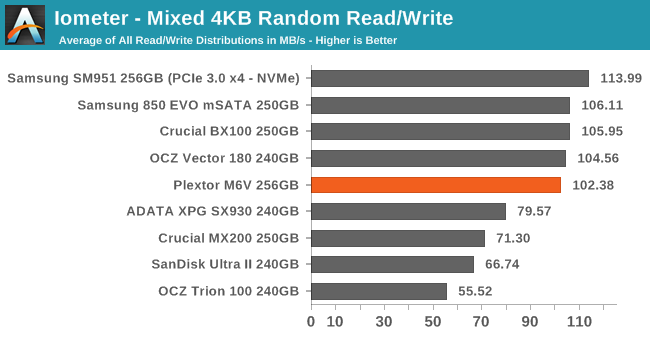
Once again the M6V is in the top performance tier, but is the slowest of that bunch. The SATA interface isn't even close to being a limitation here.
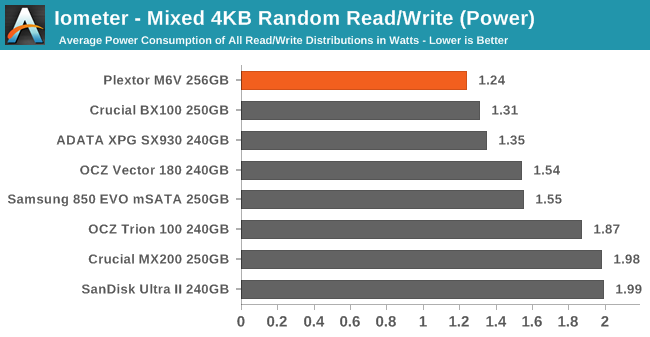
The slight degree to which the M6V lags behind the performance of the BX100 is made up for by the power savings.
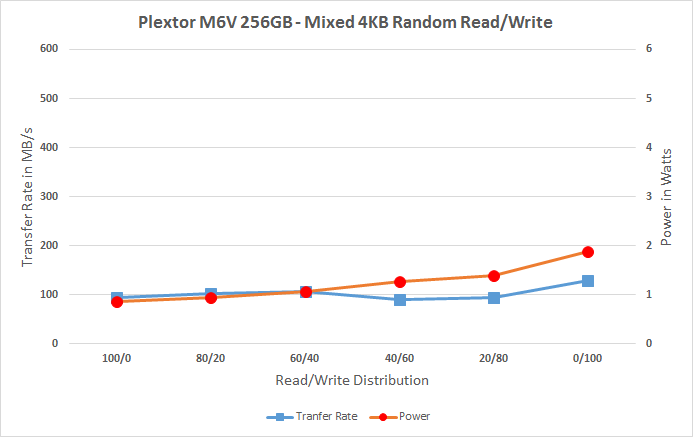 |
|||||||||
| Default | |||||||||
Performance is pretty flat across this test, and the power consumption grows slowly as more writes are thrown in to the mix. The OCZ Vector 180 pulls ahead on the strength of its performance in the 100% write test, while the Crucial BX100 and Samsung 850 EVO are helped by stronger performance in the read-heavy parts of the test.
Mixed Sequential Read/Write Performance
The queue depth of 3 is sufficient for many drives to perform very well at either end of this test, while testing 100% reads or 100% writes. In between, performance typically suffers greatly, and that's where the winners and losers of this test are determined. Anything that's duplicating duplicating or transforming a large amount of data on the drive will produce I/O patterns similar to this test. Creating a System Restore snapshot, backing up files to a different directory on the same drive, and file compression can all produce interleaved reads and writes of large blocks of data, though not necessarily fast enough to be limited by the drive's performance.
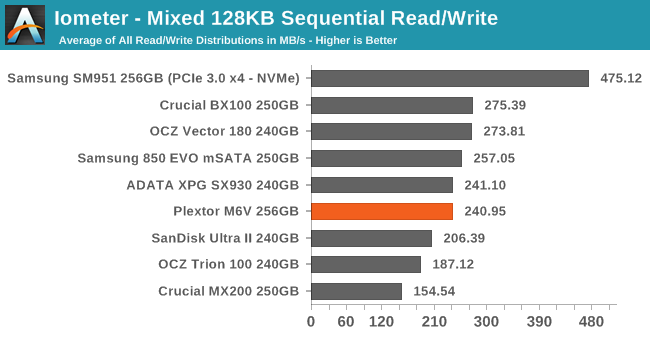
The Crucial BX100 performed very well on this test, but the M6V is only average here.
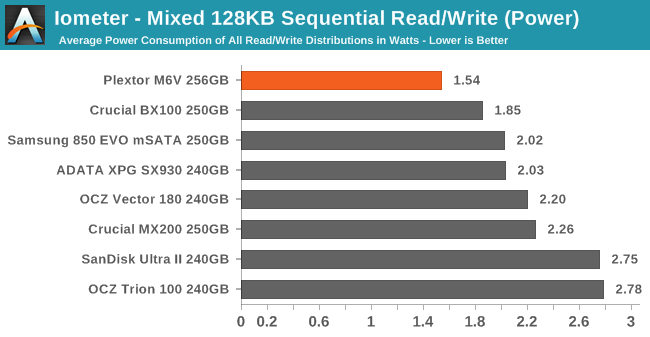
The M6V is once again solidly in the lead for power consumption, and is well ahead of even the BX100.
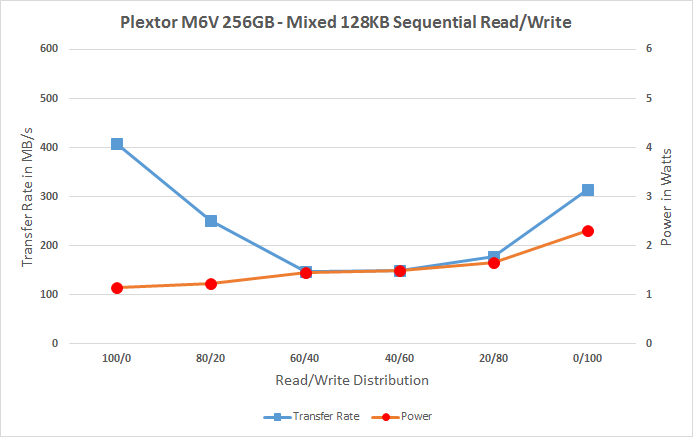 |
|||||||||
| Default | |||||||||
The M6V drops just below 150MB/s during the worst parts of this test, then recovers well as the workload shifts toward pure writes. Its relatively low performance on the 100% read and 100% write portions of the test are keeping the average down.










51 Comments
View All Comments
Vepsa - Monday, October 12, 2015 - link
Because not everyone needs or can afford a PCIe SSD. Or they have a computer that can't boot from one. I'd love two 250GB SSDs for my home server, but they have to be SATA or SAS because all its PCIe slots are full.Mr Perfect - Monday, October 12, 2015 - link
Yes, SATA it's still quite relevant. It's not exciting, but we can all use them.hyno111 - Monday, October 12, 2015 - link
There are currently no consumer PCIe SSD for laptops. SM951s are for OEM and may have trouble finding warranty. 950 pro is not out yet.Not to mention prices..
close - Monday, October 12, 2015 - link
So it's integrated GPU if you want power savings and Titan X SLI if you want performance. Nothing in between?There are shades of gray (maybe less than 50 are distinguishable though). Where do I fit a PCIe SSD? Unless it's a PCIe card then it's out. Also the price is a downer as while it may bring huge performance benefits, they don't justify the price for most users.
And don't forget that *any* computer out there will hugely benefit from even a cheap SSD while upgrading from that cheap SSD to an expensive one upgrading will bring less impressive improvements.
xenol - Monday, October 12, 2015 - link
The practical performance for many operations on secondary memory do not make anything beyond a SATA based SSD worthwhile. Go look up anecdotal reviews of RAM Drives, and you'll find many operations, despite RAM Drives offering orders of magnitude better performance, offer at best 10% better performance. Is it worth spending nearly twice as much on a PCIe drive than it is to get an SSD with double the capacity for what amounts to a 10% performance increase? No.Also, most storage operations that happen during regular use of a PC are very tiny. Most of them are <128KB in size. At that point, bandwidth is insignificant, but latency is what matters. And that's where SSDs really shine over HDDs.
Impulses - Monday, October 12, 2015 - link
It's all relative, there's plenty of common content creation scenarios where a PCI-E SSD makes a big big difference... Whether it's worth it or not is pretty subjective.Enthusiasts used to pay for stuff lime Raptor where the difference was relatively minor by comparison... Small (256GB) SM951 for me right now for the OS/apps, 2x1TB 850 EVOs for most else, why make it either/or? (on a desktop anyway)
xenol - Monday, October 12, 2015 - link
If you're on an unlimited budget, then sure, go spend money on the bestest thing possible.But if you're on a limited budget, sacrificing a few things here and there because they don't add much to the pie are the decisions you have to make. If you're a gamer, PCIe SSDs are worthless. Go spend the difference on a better video card. If you're a content creator, it still depends on the content being created. The only time I can ever see a high speed SSD as necessary is if you're dumping a ton of data from somewhere. Otherwise, just throw more RAM at the problem. Besides that, the CPU is probably still the biggest bottleneck in those scenarios (a year or two ago, someone mentioned that Intel's Ivy Bridge E was the only part he could find that could do a 1:1 BD-ROM rip and encode, which means for a 2 hour video and assuming the entire 25GB was used, the CPU was pumping out ~120MB/s... You can easily sustain that on a hard drive)
StrangerGuy - Tuesday, October 13, 2015 - link
Define "enthusiasts". Long ago during Raptor days there were also a huge mass of so-called "enthusiasts" who recommended against Raptors because they were a big stinking waste of money compared to regular 7200 rpm drives. Enthusiasts aren't people who will mindlessly throw good money for some ultra niche hardware they don't need despite what you want us believe.name99 - Monday, October 12, 2015 - link
Oh don't be narrow-minded.In just the last month I have
(a) replaced the HD in a friend's old MacBook Pro with an SSD (to speed up the machine)
(b) had the HD in my 3-yr old iMac fail (not exactly fail, but enough SMART warnings that it's time to stop gambling on it staying alive), so I switched to booting off a 1TB SSD stuck in a USB-3 enclosure.
Both of these were perfect use cases for a SATA SSD...
Coup27 - Monday, October 12, 2015 - link
What on earth are you smoking? (dj_aris)